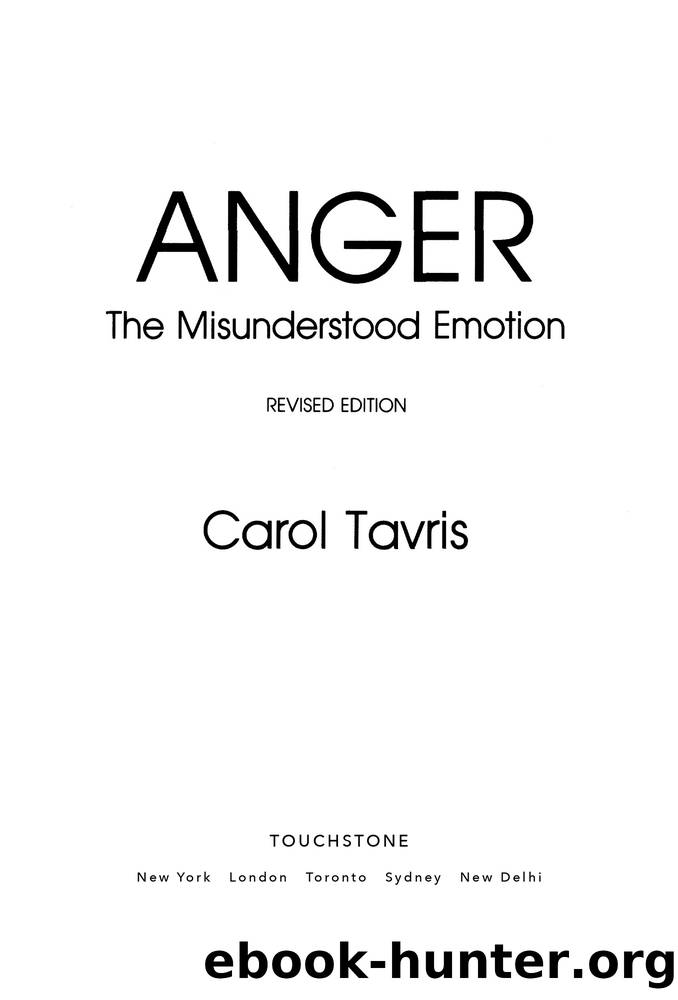Anger by Carol Tavris

Author:Carol Tavris
Language: eng
Format: epub
Publisher: Touchstone
THE STEREOTYPE UP CLOSE
For each of these eleven statements, please indicate how true or false it is of you:
1. I lose my temper easily but get over it quickly.
2. I am always patient with others.
3. I am irritated a great deal more than people are aware of.
4. It makes my blood boil to have somebody make fun of me.
5. If someone doesnât treat me right, I donât let it annoy me.
6. Sometimes people bother me just by being around.
7. I often feel like a powder keg ready to explode.
8. I sometimes carry a chip on my shoulder.
9. I canât help being a little rude to people I donât like.
10. I donât let a lot of unimportant things irritate me.
11. Lately, I have been kind of grouchy.
You have just taken the âirritabilityâ scale of the Buss-Durkee Inventory. Surely, you would agree, men would be more likely than women to say they are blood-boiling, grouchy powder kegs with chips on their shoulders (psychologists never seem to worry about mixing metaphors), and women to reveal themselves as patient Griseldas . . . who are maybe irritated more than âpeople are aware of.â In fact, according to Arnold H. Buss, coauthor of this scale, no sex differences have yet surfaced, on samples of college students and psychiatric patients.
Nor have sex differences turned up in large surveys of adults. In Charles Spielbergerâs studies of âanger-inâ and âanger-outââbased on his State/Trait Anger Expression Inventory, which has been given to thousands of people of all agesâmales have higher scores than females on anger-in (pouting and sulking, harboring grudges, feeling secretly critical of others, keeping things in, feeling âangrier than Iâm willing to admitâ). Spielberger has found no sex differences on anger-out (that is, the readiness to express anger, strike out, make sarcastic remarks, and so on).
Even among people for whom anger is a trait (a characteristic aspect of personality) rather than an occasional, temporary state, women are as likely to be found as men. Jerry Deffenbacher, a clinical psychologist and researcher at Colorado State University, has developed a successful therapy for people with problems with chronic angerâand that includes as many women as men. Deffenbacher treats men and women who âdescribe themselves as having a significant personal problem with anger and desire help for it.â Males and females are angered by the same types of situations, Deffenbacher reports, and to the same degree, and they respond to treatment the same way.
Other researchers have set foot into the world to interview adults in their natural habitat. For example, two researchers recruited eighty men and women between the ages of twenty-one and sixty, and asked them straightforward questions about a real experience with anger that they had had in the last week. No self-delusions here about being patient or grouchy; each person had to tell exactly what happened, and to whom, and what they did and how they felt. The researchers then compared the menâs and womenâs answers on a total of 128 items. The differences that turned up,
Download
This site does not store any files on its server. We only index and link to content provided by other sites. Please contact the content providers to delete copyright contents if any and email us, we'll remove relevant links or contents immediately.
Should I Stay or Should I Go? by Ramani Durvasula(7641)
Why We Sleep: Unlocking the Power of Sleep and Dreams by Matthew Walker(6686)
Fear by Osho(4723)
Flow by Mihaly Csikszentmihalyi(4671)
Rising Strong by Brene Brown(4435)
Why We Sleep by Matthew Walker(4421)
The Hacking of the American Mind by Robert H. Lustig(4356)
How to Change Your Mind by Michael Pollan(4340)
Too Much and Not the Mood by Durga Chew-Bose(4321)
Lost Connections by Johann Hari(4163)
He's Just Not That Into You by Greg Behrendt & Liz Tuccillo(3873)
Evolve Your Brain by Joe Dispenza(3653)
The Courage to Be Disliked by Ichiro Kishimi & Fumitake Koga(3472)
Crazy Is My Superpower by A.J. Mendez Brooks(3380)
In Cold Blood by Truman Capote(3366)
Resisting Happiness by Matthew Kelly(3331)
What If This Were Enough? by Heather Havrilesky(3298)
The Book of Human Emotions by Tiffany Watt Smith(3284)
Descartes' Error by Antonio Damasio(3263)
